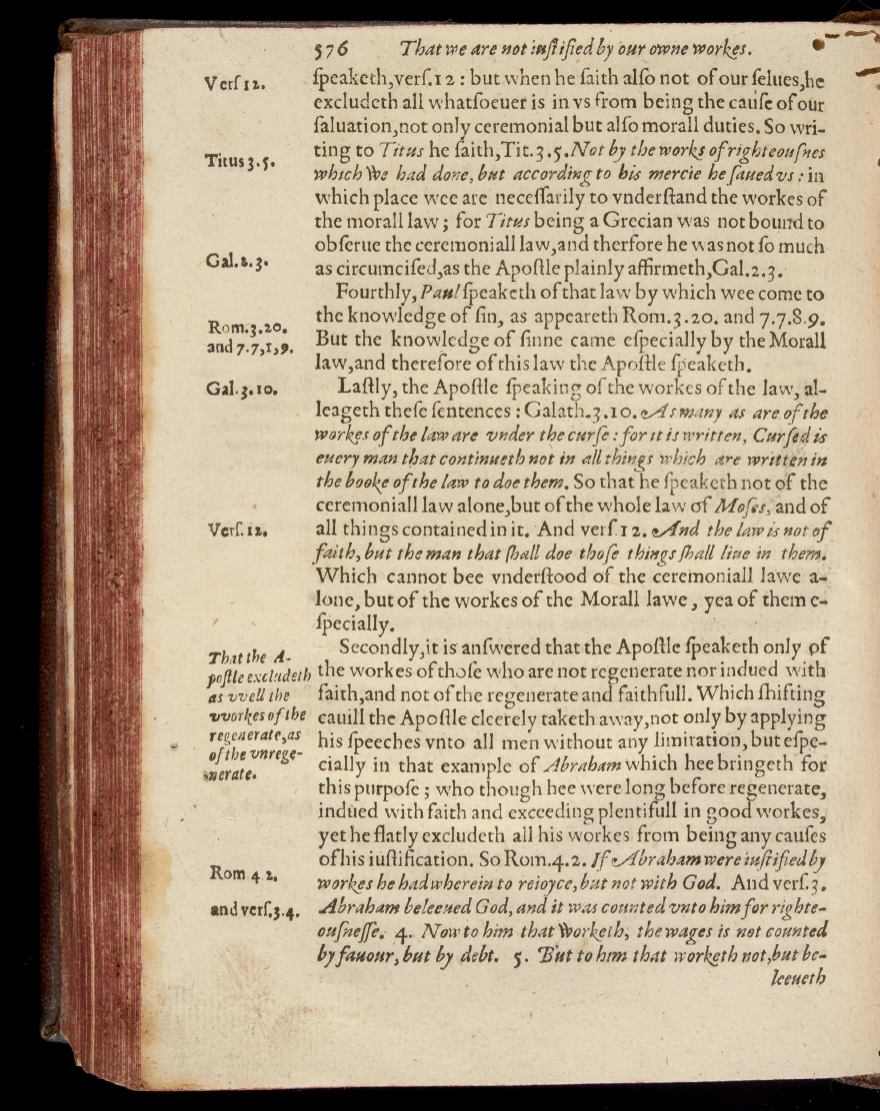

./
Var.'
t.
Titus
3,5.
Gal.L,3.
Rom.l.to.
and
7.7,t,9.
Gal
+to.
Verf.
tt.
That
the
A.
yoftle
exctr Beth
as
vvcll
the
vvorkes
of
the
regeueratc,as
of
the
vnrege-
,nerate.
Rom
4t.
and
verf;
3.4.
57
6
That
we
are
not
itsfl
ifted
by
our
omne
workes.
«
fpeaketh,verf.r
2
:
but
when he
faith alfo
not ofour
felues,he
excludeth
all
whatfoeuer
is
in
vs
from
being
the
catifc
ofour
faluation,not
only ceremonial
but
alfo
morali duties.
So
wri-
ting
to
Titus
he
faith,Tit. 3.5.¡'lot
by
the
works
of
righteou
f
res
which
foe
had
done,
but
according
to
his mercie he
faired vs
:
in
which
place wee
are
neceflarily
to
vnderfland the
workes
of
the
morali law
;
for Titus
being
a
Grecian
was
not bound to
obferue
the ceremoniall
law,and therfore
he
was
not
fo
much
as
circumcifed,as
the Apoílle plainlyaffirmeth,Gal.2.3.
Fourthly, Paul
fpeaketh
ofthat
law
by which
wee
come
to
the knowledge
of
fin,
as
appeareth
Rom.3.20.
and
7.7.8.9.
But the
knowledge
of
finne
came cfpecially
by
the Morali
law,and therefore
of
this law
theApoílle
fr
eaketh.
Laflly,
the Apoílle (peaking
ofthe
workes
ofthe
law,
aI-
Ieageth
thefe fentences
:
Galath_3.ro.
_4s
many
as
are
of
the
workes
ofthe
lazv
are vnder
the curfe
:
for
it
is
written,
Curled
is
emery ratan
that
continueth not in all
things
which
are written
in
the
bootie
ofthe
law
to
doe
them. So
that
he
Çtleaketh
not
of
the
ceremoniall law alone,but
ofthe
whole law
ofMof
s,
and
of
all
things
contained
in
it.
And
verf.
12.
efnd
the
lawis not
of
faith, but
theman
that
(hall
doe
then
things
/hall
live
in
them.
Which cannot
bee vnderflood
of
the
ceremoniall lawe
a-
lone, but
of
the
workes
of
the Morali
lawe,
yea
of
them e-
fpecially.
Secondly,it
is'
anfwered
that
the
Apoílle fpeaketh only
pf
the workes
ofthofe
who
are
not
regenerate
nor
indued
with
faith,and not
ofthe
regenerate and
faithfull. Which
(Lifting
cauill
the Apofile
cleerely
taketh away,not
only by
applying
his fpeeches
vnto
all
men
without
any
limitation,
but
efpe-
cially
in
that
example
of
Abraham which hee
bringeth
for
this
purpofe
;
who though
hee
were
long
before regenerate,
indtted with
faith and exceeding plentifull in
goodworkes,
yet
he flatly excludeth
all
his
workes from
being
any
caufes
ofhis
iuflification.
So
Rom.4.2.
t/Tbrahamwere
workes he
had
wherein to
reioyce,
but
not with
God.
And verf
3
.
Abraham
belee.sed God,
and it
was
countedvnto him
for
thte-
oufrreffe.
4.
Noun
to
him
that
117
orketh, the
wages
is
not counted
by
fatiour, 6ut
by
debt.
5.
Vint to him
that
txorketh
not,but
6e-
leeueth

















